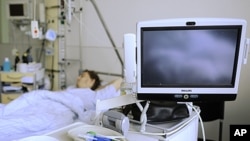The World Health Organization reports no progress has been made in identifying the mysterious, lethal strain of E. coli that has infected and killed an unusually large number of people in northern Germany. Latest WHO figures put the number of global cases at more than 1,800, including 18 deaths. Of these, more than 1,700 cases and 17 deaths are in Germany.
The World Health Organization reports this deadly new strain of E. coli has spread to 12 countries, since the first infections were reported in northern Germany in mid-May.
Scientists at laboratories around the world are working to gather information about this rare strain of E. coli, which can cause severe renal failure. But the source of the massive outbreak remains unknown.
|
E. coli and how it is transmitted E. coli is an abbreviation for Escherichia, which is a large and diverse group of bacteria. Most strains are harmless, others can cause illness. Symptoms include stomach cramps, diarrhea and vomiting. The major source is cattle, but other animals, foods and liquids may spread contamination to people.
|
One case of person-to-person contact has been identified. WHO epidemiologist Andrea Ellis says the bacteria is spread from human to human usually from the feces of an animal that is actually consumed by people.
"So, you can imagine that person-to-person transmission can occurr if there is inadequate hygiene," said Ellis. "So, for example, if somebody has diarrhea and uses the washroom, but fails to wash their hands, then that can then transfer bacteria onto surfaces, or even shaking hands and other personal contact that could, in fact, allow person-to-person transmission."
"So, it is nothing that would be unique to this situation. It really is more something that we are always concerned about. And, that is why the messages of washing your hands, paying vigilant attention to proper personal hygiene are always something we want to reinforce in these circumstances," she added.
Dr. Ellis notes until now, all identified cases are linked to northern Germany. People who got sick and died either have been residents of or travelers to this region.
"That has been a very unique feature because we were concerned that, of course, with any food-borne outbreak, we are always worried about where else has the food been sold," she said. "And, so, what it seems to be evident up to this moment in time is that, it seems that the exposure that is occurring that is responsible for this seems to be limited to that area. So, there certainly are no…recommendations from WHO in terms of travel or trade restrictions at this time. Those would not be warranted."
The outbreak of this fatal illness has triggered panic in Europe. Consumers stopped buying Spanish cucumbers when German authorities wrongly identified them as the source of the bacteria.
Russia says it is banning fresh vegetable imports from the European Union - a move that could bankrupt many farmers.
E. coli attacks the kidneys and can cause seizures, strokes and comas. Dr. Ellis says only about 10 percent of those who get infected from an outbreak of food poisoning suffer severe complications, and most recover.
In the case of this new strain, she says an unusually high number of victims are affected, and that is very worrying.




